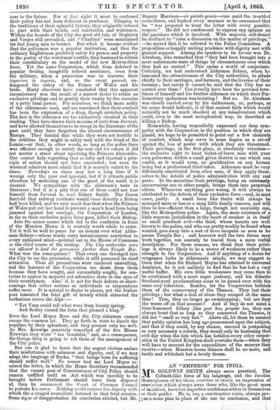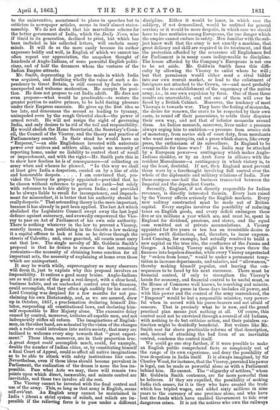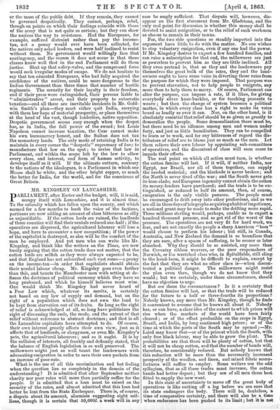AN "EMPEROR" FOR INDIA.
GOLDWIN SMITH always seems practical. The LVI Cobbett-like force of his language, and the Jacobin thoroughness of his ideas, combine to create an impression of conviction which always awes those who, like the great mass of mankind, have but imperfect confidence either in themselves or their guides. He is, too, a constructive critic, always pro- toss some plan in place of the one he condemns, and that to the uninventive, accustomed to plans. in speeches but to criticism in newspaper articles, seems in itself almost states- manship. We do not doubt that his marvellous scheme for the better government of India, which the Daily Hews, wise if timid in its generation, declined to print, but which has been included in his collected letters, will enchain many minds. It will do so the more easily because its author expresses boldly and well, in English of which we cannot too often repeat our appreciation, the unspoken thought of hundreds of Anglo-Indians, of some powerful English politi- cians, and of half the dreamers whom the vastness of the Indian Empire attracts.
Mr. Smith, deprecating in part the mode in which India was acquired, and doubting wholly the value of such a de- pendency to Great Britain, is still coerced by facts into an unexpected and welcome moderation. He accepts the posi- tion. He does not propose to cut India adrift. He does not -even propose—what would be practicable—to restore the greater portion to native princes, to be held during pleasure under their Empress suzerain. He gives up the first idea as too late, and denounces the second as leading to tyranny, unimpeded even by the rough Oriental check—the power of armed revolt. He will not resign the right of governing India, and only desires to be rid of the toil and responsibility. He would abolish the Home Secretariat, the Secretary's Conn- -eil, the Council of the Viceroy, and the theory and practice of Parliamentary control. In their stead he would have an Emperor,"—an able Englishman invested with autocratic power over natives and settlers alike, under no necessity of reporting home, under no liability to control short of recall -or impeachment, and with the right—Mr. Smith puts this in to show how fearless he is of consequences—of collecting an army when and whence he pleased. "In this way we shall at least give India a despotism, carried on by a line of able and honourable despots I am convinced that, pro- vided the Viceroy be properly appointed—provided that he -be chosen without reference to party or to rank—but solely with reference to his ability to govern India; and provided he be always liable to recall for incompetency, and impeach- ment for misconduct, it is better that his authority should be really despotic." That astounding theory is the more important, because it has already in part been applied. The last Act which abolished the Legislative Council swept away the last legal -defence against autocracy, and avowedly empowered the Vice- roy to pass an Act of Parliament of his own sole authority. There is nothing whatever in the law to prevent a Viceroy, secretly insane, from publishing in the Gazette a law making it a capital offence to look at him as he drives through the -streets of Calcutta; and, once gazetted, all courts must carry out that law. The single novelty of Mr. Goldwin Smith's proposal is that he desires to remove the last remaining restraints—the necessity of obtaining home sanction for all important acts, the necessity of explaining at home even those -which are unimportant.
It may be worth while, supererogatory as many observers will deem it, just to explain why this proposal involves an impossibility. It entices a good many brains. Anglo-Indians -are so well aware of the good a real despot, with a clear head, business habits, and an unchecked control over the finances, could accomplish, that they often sigh audibly for his arrival. Lord Canning was despised for a few months for not pro- claiming his own Dictatorship, and, as we are assured, drew up in October, 1857, a proclamation declaring himself Dic- tator, suspending all constitutional laws, and declaring him- self responsible to Her Majesty alone. The excessive delay caused by control, moreover, irritates all capable men, and not infrequently stifles all reform. The imaginations of English- men, on the other hand, are soheated by the vision of the changes such a ruler could introduce into native society, that many are inclined to welcome every step towards that "great experi- ment." These ideas, moreover, are in their proportion true. _ A great despot could accomplish much, could, for example, double the number of Indian cities, or, by constituting himself a final Court of Appeal, could so affect all native imaginations as to be able to attack with safety institutions like caste. Nevertheless, even if these ideas should become prevalent in Parliament, the realization of the dream is none the less im- possible. Pass what Acts we may, there will remain two points upon which direct, inexorable, and minute control are inevitable, and those two involve all the rest.
The Viceroy cannot be invested with the final control and use of the army. This, so long as that army is English, seems selt.evis'e.nt. An English army cannot be maintained in. India i i.thout a strict system of reliefs, and reliefs are im- possible if the relieving force is to pass under a different discipline. Either it would be laxer, in which case the soldiery, if not demoralized, would be unfitted for general service; or it would be more despotic, in which case we should have to face mutinies among Europeans, the one danger which the empire cannot endure in safety. Men familiar with the sub- ject know well that the army is not exactly a machine, that great delicacy and skill are required in its treatment, and that the protection afforded by the reverence all Englishmen feel for Parliament is in many cases indispensable to discipline.
The lesson afforded by the Company's Europeans is not one to be set aside. Mr. Goldwin Smith facee this diffi- culty by allowing the Viceroy to enlist where he will ; but that permission would either send a rival bidder into our own recruit market, or lead to the enlistment of foreigners not attached to the Crown, or—and most probably —end in the re-establishment of the supremacy of the native army, i.e., in our own expulsion by force. One of those three results are unavoidable, and not one of them will ever be faced by a British Cabinet. Moreover, the tendency of most Viceroys is towards war. They have the feeling of monarchs, the desire for renown, the crave to be respected by their own caste, to round off their possessions, to settle their disputes their own way, and not that of inferior monarchs around them. An Indian monarch, moreover, lives under a pressure always urgino.c him to ambition—a pressure from armies sick of monotony, from navies sick of coast duty, from merchants who want new entreptits, and a press which shares, like every press, the enthusiasm of its subscribers. Is England to be irresponsible for those wars ? If so, India may be attacked by a European power—a contingency which makes Anglo- Indians shudder, or by an Arab force in alliance with the resident Mussallans—a contingency in which victory is, to say the least, doubtful. If not, then England must prevent those wars by a forethought involving full control over the whole of the diplomatic and military relations of India. Now these compose one-half the business transacted between the Imperial and the dependent Courts.
Secondly, England, if not directly responsible for Indian revenues is directly interested therein. Every loan raised by the Viceroy affects seriously the English markets. Every new railway constructed must be made out of British capital. Every surplus involves the possibility of reducing taxes on English goods, and every deficit endangers those five or six millions a year which are, and must be, spent in England for dividend, pensions, and stores, and the equal sum remitted out of private accumulations. A Viceroy appointed for five years or ten has an irresistible desire to acquire swift distinction, and, therefore, to incur expense. Lord Canning, for example, had actually resolved to build a new capital on the true site, the confluence of the Jumna and Ganges. A building Viceroy might in five years throw the finances into hopeless disorder, while every Viceroy unprotected by "orders from home," would be under a permanent temp- tation to increase departments, and salaries, and "allowances," thereby making himself popular, and leaving the con- sequences to be faced by his next successor. There must be financial control, if only to strengthen the Viceroy's hands for economy, and financial control to be useful must, as the House of Commons well knows, be searching and minute. The power of the purse in these days includes all power, and with this power and the control of the army surrendered, the "Emperor" would be but a responsible minister, very power- ful when in accord with his purse-bearers and not afraid of censure. That is precisely what he is now, and the grand practical plan means just nothing at all. Of course this control need not be exercised through a council of old Indians, with nothing to do but criticize action, and their painless ex- tinction might be decidedly beneficial. But writers like Mr. Smith soar far above practicable reforms of that description, and, instead of attacking the bad form of an inevitable control, condemn the control itself.
We could go one step further, if it were possible to make an English public comprehend facts so completely out of the range of its own experience and deny the possibility of true despotism in India itself. it is always imagined, by Sir Charles Wood, for instance, that the Viceroy, provided his power is legal' can be made as powerful alone as with a Parliament behind him. He cannot. The "oligarchy of settlers," whom Mr. Goldwin Smith contemns, are far more powerful than he believes. If they are expelled, the possibility of making India rich ceases for it is they who have created the trade which has tripled wages, and added sixty millions in nine years to the currency of one province alone, and who have lent the funds which have enabled Government to tide over dangerous crises. It is not the natives who own the railways or the mass of the public debt. If they remain, they cannot be governed despotically. They cannot, perhaps, rebel, though on points on which their feelings coincide with those of the army that is not quite so certain ; but they can show the natives the way to resistance. Had the Europeans, for example, suffered distraint rather than pay the income- tax, not a penny would ever have been collected, for the natives only asked leaders, and were half inclined to resist without them. No government would willingly face that contingency, and the reason it does not occur is that these classes know well that in the end Parliament will do them justice. Shut up that safety-valve, and the compressed force would seek irregular modes of escape. We do not hesitate to say that ten educated Europeans, who had fully acquired the confidence of the natives, could be more dangerous to the Indian Government than three times that number of hostile regiments. The security for their loyalty is their freedom, and if their press were extinguished, their persons liable to " administrative " arrest, and their property to autocratic taxation—and all these are inevitable incidents in Mr. Gold- win Smith's plan—they must either quit India, carrying with them her hope of material prosperity, or place themselves at the head of the vast, though leaderless, native opposition. Despotic government seems easy enough when the despot has, as in India, the full power of the sword ; but Louis Napoleon cannot increase taxation, the Czar cannot make his own bureaucracy honest, and the Sultan dare not tax the monastery lands. The only mode of retaining India is to maintain in every corner the "despotic" supremacy of law; to manufacture that law on the spot ; to revise that law in Parliament, and within the scope left by the law to allow every class, and interest, and form of human activity, to develope itself as it will. If the ultimate outturn, contrary to the notions of the ideologues, is a Parliament in which one Rouse shall be white, and the other bright copper, so much the better for India, for the world, and for the conscience of Great Britain.
































 Previous page
Previous page